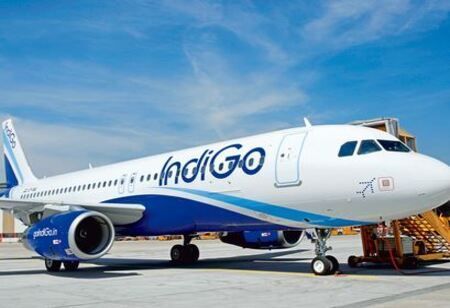
IndiGo to be 1st Airline to Commence Operations from Navi Mumbai Airport


With 18 daily flights to 15 cities starting on the first day of the airport's commercial operations, IndiGo announced that it will be the first airline to operate from the soon-to-be Navi Mumbai International Airport (NMIA).
By November of this year, the airline intends to greatly expand its operations at NMIA, increasing from 36 air traffic movements (ATMs) per day on the first day to 79 daily departures (158 ATMs), including 14 international flights.
By March 2026, IndiGo plans to run more than 100 daily departures (200 ATMS). The operations will be expanded to 140 daily departures (280 ATMs), including 30 international trips, by November 2026.
In the upcoming months, NMIA is anticipated to begin commercial flying operations.
A joint venture between Adani Airport Holdings Ltd. (AAHL), which owns 74 percent of the project, and CIDCO, the Maharashtra government's development agency, which owns the other 26 percent, Navi Mumbai International Airport Ltd. (NMIAL) is developing NMIA.
Mumbai International Airport Ltd. (MIAL), which runs Mumbai's current Chhatrapati Shivaji Maharaj International Airport (CSMIA), is also owned by AAHL.
With more than 45 million people passing through each year, CSMIA is one of the busiest airports in the world. Due to nearby metropolitan development, it confronts severe congestion and little room for growth.
MIAL intends to destroy Terminal 1 (T1) at CSMIA in November 2025 in order to build a new, contemporary terminal with a marginally larger capacity due to structural safety concerns. About 5 million passengers will be moved to Terminal 2 (T2) during the redevelopment phase, with the remaining 10 million passengers staying at NMIA.
Stakeholders, however, have opposed the destruction plan. The Airports Authority of India (AAI) has objected to MIAL's plan to destroy T1 completely at once, arguing that a phased demolition strategy will cause the least amount of disturbance.
Concerns over the possible reduction of take-off and landing slots at CSMIA during the renovation phase have also been raised by the International Air Transport Association (IATA) and other airlines.
They contend that such cuts would cause operational disruptions and have a lasting effect on the airport's standing internationally.
It is anticipated that the opening of NMIA will improve regional connectivity and spur economic growth by reducing traffic at CSMIA and creating a dual-airport system for Mumbai.
Also Read: Indian Railways Lucky Yatra to Curb Ticketless Travel
NMIA will transport 0.8 million metric tons of goods and 20 million passengers a year in its first phase. When finished, it can hold 3.2 million tons of freight and 90 million people. There will be two parallel runways at NMIA.